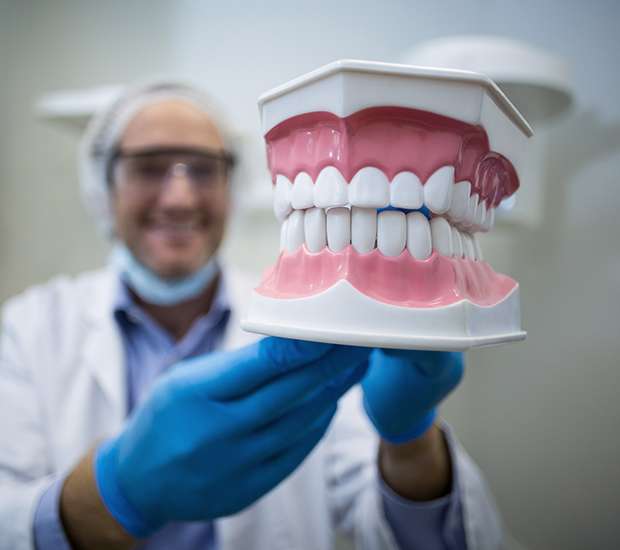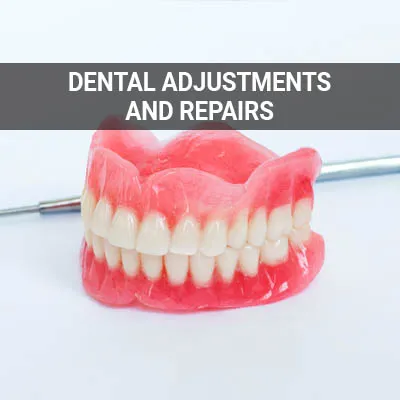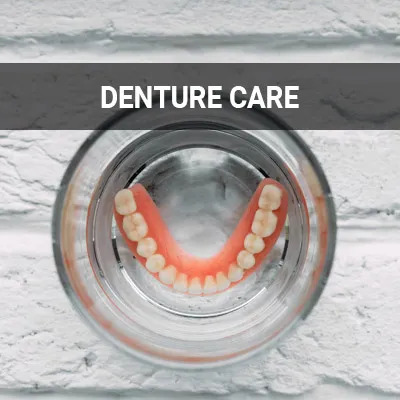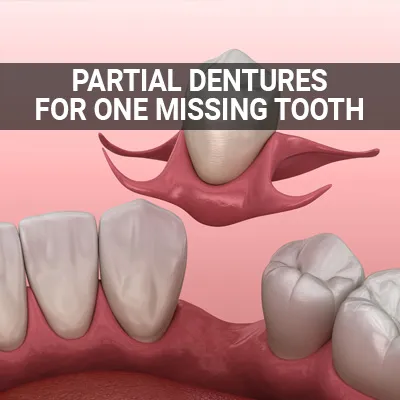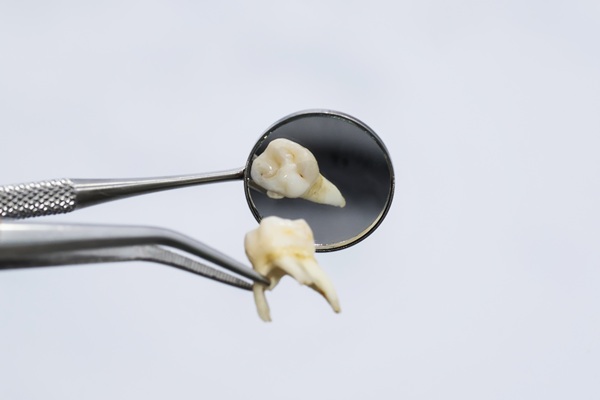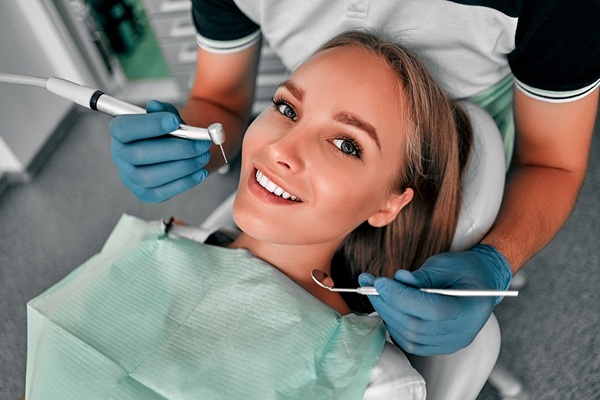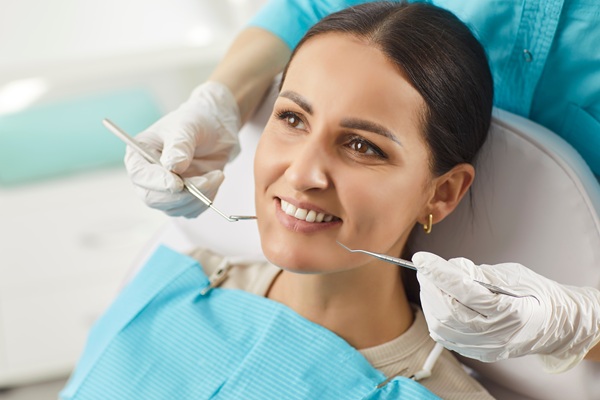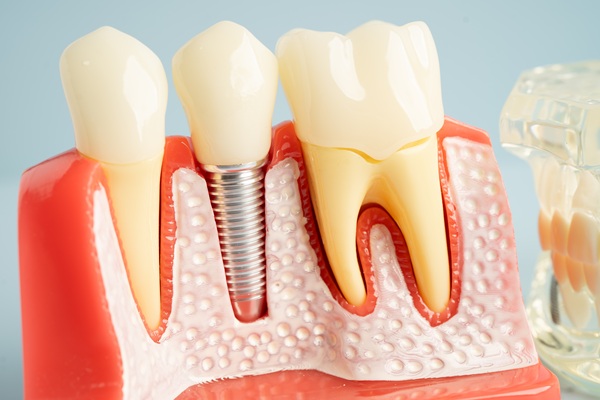Denture Relining Brooklyn, NY
Denture relining and rebasing provides a secure, comfortable fit inside the mouth, thereby extending the lifetime of the patient's dentures. Our team uses these two procedures to adjust dentures instead of replacing them frequently as patients age. Denture rebasing allows dentists and prosthodontists to replace the base of the appliance while preserving the artificial teeth, and denture relining involves adding material to the base to provide a more secure fit.
Denture relining and rebasing services are available at Nostrand Dental in Brooklyn and the surrounding area. We use these procedures to restore dentures and make them more comfortable as patients age. Having dentures adjusted regularly allows them to last longer and provides a comfortable fit throughout their lifetime.
Our experienced team is standing by to make your dental appliances seem new again. Whether you wear complete or partial dentures, let us modify them with relining or rebasing to improve the fit and keep them comfortable. Call (718) 513-9685 today to make an appointment at your convenience.
How to Tell When Dentures Need to Be Relined or Rebased
You should make a dental appointment any time your dentures feel uncomfortable. Dentures must fit properly, so they do not rub on the gums and create sore spots. Most patients will need to have their dentures adjusted after tooth loss, as reshaping of the gums and jawbone will naturally follow.
The American College of Prosthodontists explains that many patients mask these changes by using denture adhesives to ensure the prosthetics stay in place. However, relining will still be necessary. Denture relining involves adding material to the existing base of the denture (the part that supports the artificial teeth) to make it hug the patient's gums and stay in place.
“Dentures must fit properly, so they do not rub on the gums and create sore spots.”
Types of Relining
When wearing dentures, it is natural for the jawbone to change over time. This may cause the dentures to become loose and irritate the gums. Not only is this uncomfortable, it can also make it challenging to speak and chew. There are three different types of relining:
- Hard reline. This type of relining is usually recommended for patients with full dentures. Hard relining is generally made from acrylic and is required every two months to ensure the dentures fit comfortably.
- Soft reline. This type of relining is usually recommended for patients with sensitive gums or those who have only had their new dentures for three to six months. Soft relining is made from a soft, pliable material, and will require more adjustments than a hard reline.
- Temporary reline. This type of relining is usually recommended for patients who have not been to the dentist in a long time and have very sore and red gums. Temporary relining is typically soft and helps the gums heal. Afterward, the dentist will cast for a new denture or hard reline.
“When wearing dentures, it is natural for the jawbone to change over time.”
How to Prevent Denture Relining and Rebasing
No amount of care can prevent bone and gum shrinkage stemming from dental extractions. Fortunately, patients can still take steps to avoid unnecessary rebasing due to their dentures breaking. Dentures that dry out are at risk for warping and losing their shape. Submerging them in water or a special solution can prevent this from happening.
Patients should take certain precautions when cleaning dentures. They should work over a soft towel or a sink full of water to protect the dentures from hitting a hard surface and breaking. A soft-bristled toothbrush topped with a non-abrasive cleaner can gently brush the surface of the dentures without scratching them.
“No amount of care can prevent bone and gum shrinkage stemming from dental extractions.”
Check out what others are saying about our dental services on Yelp: Denture Relining in Brooklyn, NY
Rebasing
According to the American Dental Association, if the base has begun to deteriorate, the dentist will recommend rebasing. This is the process in which a new base is created. The new base is modeled after the existing denture. Our team takes a new cast of the patient's mouth and uses it to create an entirely new base. We will then place the current denture teeth on this new base.
Rebasing may be necessary when the denture becomes broken or damaged, the denture base is weakened, or an immediate denture requires replacement. In-denture rebasing, only the acrylic denture base is replaced (that is, the teeth are left alone).
“…if the base has begun to deteriorate, the dentist will recommend rebasing.”
Questions Answered on This Page
Q. How can I tell if my dentures need to be relined or rebased?
Q. How can I prevent denture relining and rebasing?
Q. What are the types of denture relining?
Q. What can I expect from denture rebasing?
Q. Why is relining is essential for denture care?
People Also Ask
Q. What happens during a denture fitting appointment?
Q. What are partial removable dentures for one missing tooth?
Q. Should I contact you immediately after damaging my dentures?
Q. How do removable partial dentures work?
Q. What should I do if my dentures start to feel uncomfortable?
Relining Is Essential for Denture Care
Patients whose dentures are in good condition but fit improperly, may require denture relining. Instead of replacing the base, our dentist adds material to the current base to make it fit more securely against the gums. This process helps conform the denture base to the changed shape of the gums, providing a better fit.
Relining is a procedure that reshapes the underside of a denture to fit more snugly and comfortably on the patient's gums. It is typically a relatively short and simple process. Denture relining is necessary when bone deterioration changes the fit of the dentures.
“Relining is a procedure that reshapes the underside of a denture to fit more snugly and comfortably on the patient’s gums.”
Frequently Asked Questions
Q. What are the costs associated with denture relining and rebasing?
A. The costs associated with denture relining and rebasing depend on a number of factors, including the dentist's proposal, the type of denture reline process, and the type of dental prosthesis. When it comes to cost, we will consider your insurance plan and preferred form of payment.
Q. Are my gums in danger of receding?
A. There are several risk factors for receding gums, including but not limited to aggressive brushing, tartar buildup, smoking, genetics, diabetes, and HIV. Hormonal changes in women may also lead to gum recession.
Q. Does denture relining and rebasing hurt?
A. Improper denture repair can potentially lead to pain. At Nostrand Dental, we will do everything in our power to minimize any risks.
Q. What are mini-implants?
A. As the name suggests, mini-implants are smaller dental implants. They have the same structure as regular implants, but consist of a one-piece screw less than 3mm in diameter. They also include a ball-shaped end protruding from the jawbone.
Q. What is the recovery time for denture relining and rebasing?
A. A patient can resume a normal lifestyle immediately after denture relining. The new fit may cause mild discomfort for a few days, but over-the-counter medications should relieve it. Patients may need to schedule a follow-up appointment with the dentist to ensure the denture fit is correct.
Q. What do I do if my denture for one missing tooth loosens over time?
A. Call us immediately for an adjustment. Avoid moving the denture around in the mouth, as this can loosen it.
Denture Terminology
Call Us Today
A person who wears dentures should be seeing the dentist at least twice each year to keep track of the condition of the dentures and avoid surprises when new dentures are needed. Denture relining or rebasing may be an option to extend the life of your dentures. Call us today at (718) 513-9685 to make an appointment.
Helpful Related Links
- American Dental Association (ADA). Glossary of Dental Clinical Terms. 2024
- American Academy of Cosmetic Dentistry® (AACD). Home Page. 2024
- WebMD. WebMD’s Oral Care Guide. 2024
About our business, license, and website security
- Nostrand Dental was established in 1998.
- We accept the following payment methods: Cash, CareCredit, Check, Discover, MasterCard, and Visa
- We serve patients from the following counties: Kings County, New York County, Richmond County, Queens County, and Nassau County
- We serve patients from the following cities: Brooklyn, Manhattan, Queens, Staten Island, and Long Island
- NY (License #46702). View License Information and Specifics
- National Provider Identifier Database (1457434540). View NPI Registry Information
- Norton Safe Web. View Details
- Trend Micro Site Safety Center. View Details
Back to top of Denture Relining
